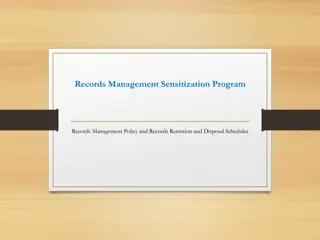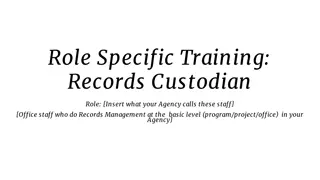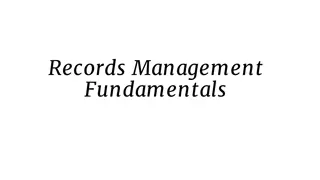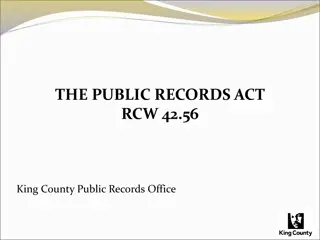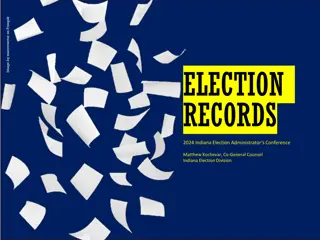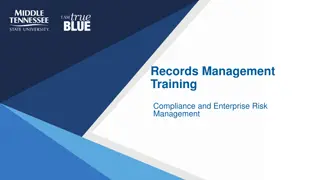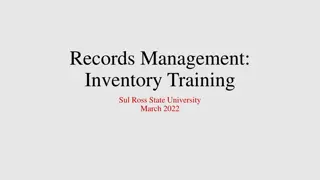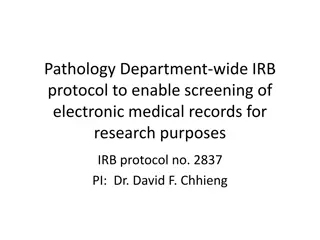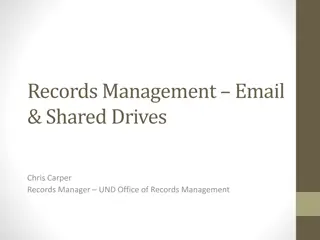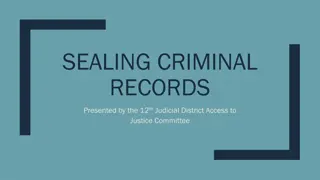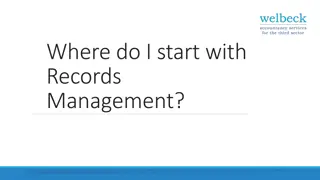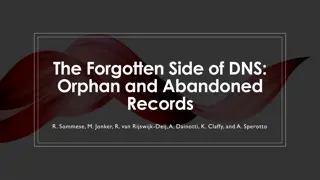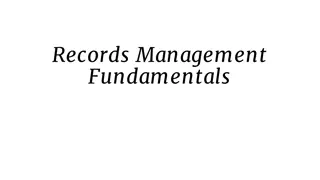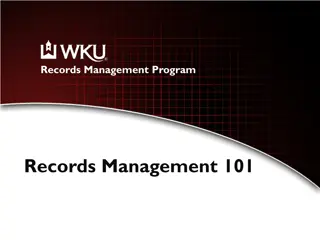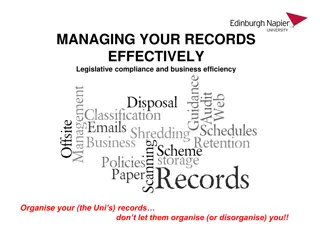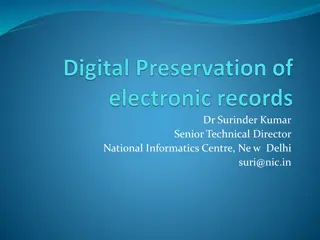Best Practices for Electronic Records Management
Electronic records management guidelines outlined by Secretary of State Jeanette Greer emphasize the importance of retaining and managing electronic records effectively. Understanding the definition of records, handling cluttered records retention, and managing electronic records properly are crucial aspects. Proper classification, storage, and disposal of electronic records according to business, legal, historical, and financial requirements are essential. Moreover, email management retention strategies and Outlook/Exchange 2010 details are provided.
Download Presentation

Please find below an Image/Link to download the presentation.
The content on the website is provided AS IS for your information and personal use only. It may not be sold, licensed, or shared on other websites without obtaining consent from the author.If you encounter any issues during the download, it is possible that the publisher has removed the file from their server.
You are allowed to download the files provided on this website for personal or commercial use, subject to the condition that they are used lawfully. All files are the property of their respective owners.
The content on the website is provided AS IS for your information and personal use only. It may not be sold, licensed, or shared on other websites without obtaining consent from the author.
E N D
Presentation Transcript
Electronic Management Guidelines Secretary of State Jeanette Greer Records Management Division Manager 402-471-2747
Records Definitions Record means any book, document, paper, photograph, microfilm, sound recording, magnetic storage medium, optical storage medium, or other material regardless of physical form or characteristics created or received pursuant to law, charter, or ordinance or in connection with any other activity relating to or having an effect upon the transaction of public business. 84-1202(4)
Electronic Records The general principles of records management apply to records in any format. Electronic records, however, raise specific issues. It is more difficult to ensure that the content, context, and structure of records is preserved and protected when the records do not have a physical presence. This has important implications for the authenticity, reliability, and trustworthiness of records. -Wikepedia
Electronic Records Electronic records that meet the definition of a record under the Records Management Act are official records and must be retained according to state and federal retention schedules. Transmitting records electronically does not alter the obligation to retain these records nor does it alter corresponding retention periods. The content of the electronic record must be evaluated to determine the length of time to retain the message.
Managing Electronic Records Electronic Records must be classified, stored, and disposed of consistent with business, legal, historical, and financial requirements. Guidelines for Records Retention are available on the Secretary of State s website using schedule 124 General Records for State Agencies or your individual agencies Retention Schedule.
Email Management Retention IS based on the content of the message. Is NOT saving all email forever. Is NOT setting arbitrary time limits for all messages. Is NOT managing based on mailbox size. Is NOT declaring email a records series. Is NOT a do-nothing strategy.
Outlook/Exchange 2010 The Microsoft Outlook/Exchange 2010 system has default retention policies/tags. Email users are to use these retention guidelines to manage the records retention requirement for email exchanges. Retention must be followed not only for the inbox but also with the sent messages box. Instant message and voice mails may be emailed to the inbox and the retention guidelines may be used to handle these electronic messages as well. Training is available on the Employment Development Website with Lynda.com for Outlook 2010
MS Outlook/Exchange 2010 RM Information Microsoft Outlook 2010 allows users to: Manage email by applying retention policies to folders and/or individual email Allows flexibility in development of personal folder organization/structure
Microsoft Outlook 2010 Default Retention Policies can be set up in email folders Automated email disposal based on retention and system cycling process can be set up. Manual management for some email is allowed. Parent folders with assigned Retention determine disposition for sub folders and email unless: Sub folder is given a different retention policy or an individual email is tagged with a different email retention policy.
Folder Retention Policies Assign a retention policy to folders: In the Navigation Pane, click on a mail folder. On the folder tab, in the Properties group, click Policy. On the Policy tab, in the Folder Policy list, click an entry based on your agency s retention schedule.
Individual Email Retention Assign a retention policy to email messages: In the message list, click on a message. On the pop up menu, select Assign Policy. Under Retention Policy, click on an entry based on your agency s retention schedule.
Retention Folders may be set to Agency Specifications
NEBRASKA STATE HISTORICAL SOCIETY COMMUNICATIONS/CORRESPONDENCE GUIDELINES FOR NEBRASKA STATE RECORDS Agency Head/CEO/Elected Official/Commission Chair Administrator/Deputy Administrator Managerial & Professional/Specialist General & Support Staff Staff SHORT-TERM (EPHEMERAL) None None None None Subject to Review by State Archives for Possible Accession. MEDIUM-TERM None None None Subject to Review by the State Archives for Possible Accession. LONG-TERM State Archives None None PROJECT- RELATED Subject to Review by State Archives for Possible Accession. Subject to Review by the State Archives for Possible Accession. None None Instructions for using this guide: 1) The 'grey' highlighted fields represent communications that should be sent to the State Archives or is subject to State Archives review once they have met the retention requirements on approved retention schedules. Contact the State Archives to negotiate the transfer. 2) Any communications that will not be accessioned by the State Archives may be disposed of once the retention requirements have been met based on approved retention schedules. Contact the State Archives with questions related to using this guide: Gayla Koerting, Curator of Government Records NE State Historical Society Phone: 402-471-4783 Email: gayla.koerting@nebraska.gov
Roundtable Discussion on Records List Serv Contract Negotiations Electronic Magazines Vacation/Sick Request or Leave Disciplinary Actions Executive Director Emails
Suggestions for Management of Email Folder If you set up folders on emails to use a default retention schedule you may then: Weekly- Empty Deleted Items Folder Check Junk Email Folder Review Sent Items Folder
Suggestions for Management of Email Folder Monthly- Review Long or 8 year folder for review by State Archives. Transfer of electronic records to State Archives is requested by security (Gold) CD.
Questions?? Comments? Suggestions?

 undefined
undefined




